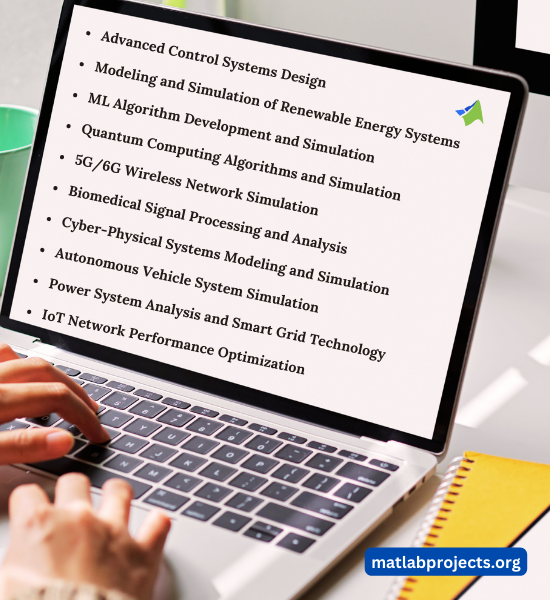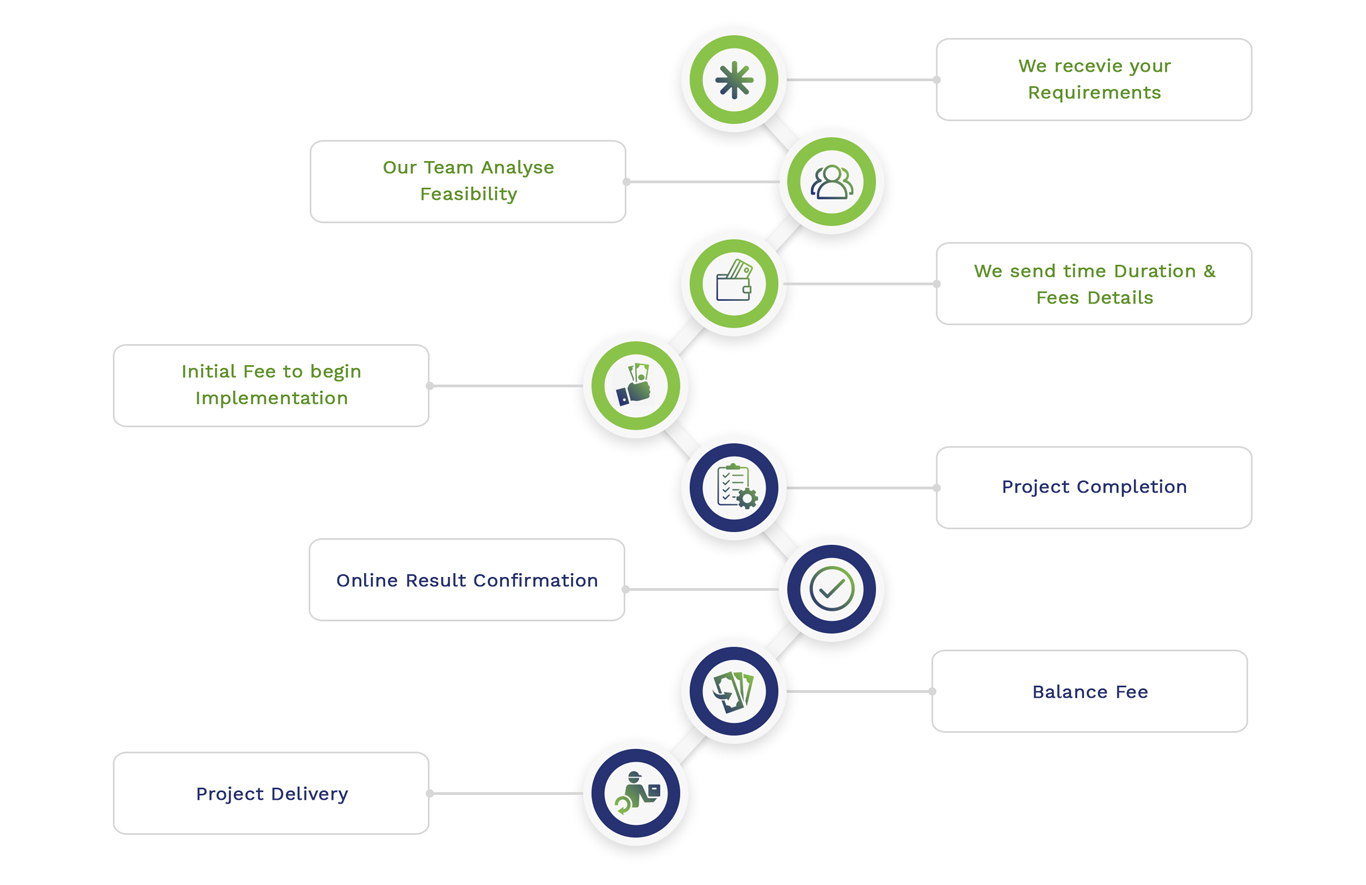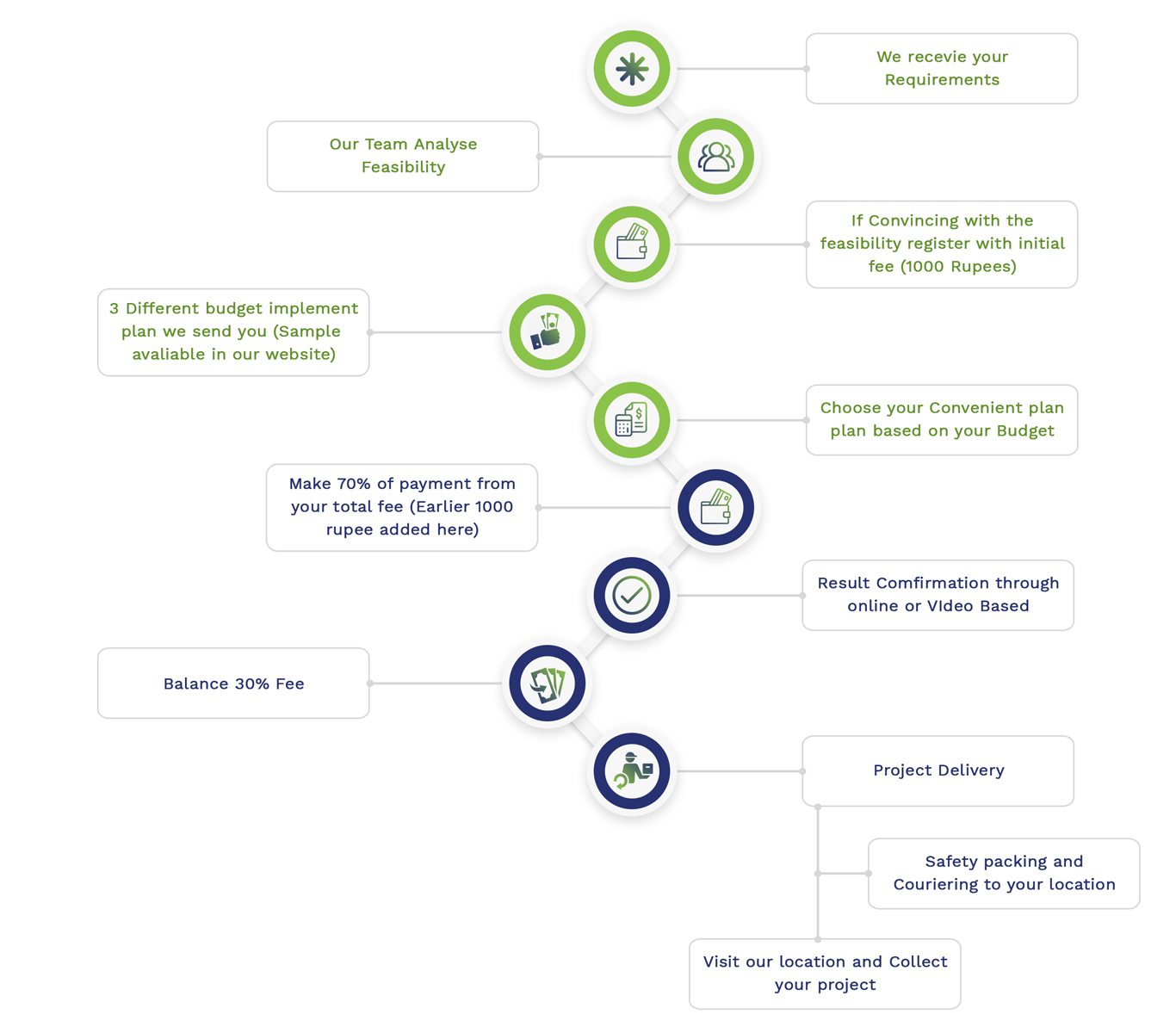Looking to kickstart your research work? Look no further other than matlabprojects.org! We’ve curated an exceptional collection of computer science project ideas and topics for students and scholars. Our handpicked ideas are tailored to meet all your requirements, ensuring a stimulating and captivating experience. There are numerous PhD thesis topics that are evolving in the domain of computer science. MATLAB Simulink is an efficient software equipment that is employed for various purposes such as designing, simulating, analyzing, etc. The following are few possible PhD thesis topics that might manipulate MATLAB Simulink:
- Advanced Control Systems Design: Employing MATLAB Simulink to create advanced control techniques for complicated frameworks such as automated vehicles, drones, or robotics.
- Modeling and Simulation of Renewable Energy Systems: In order to simulate and enhance renewable energy models, like wind turbines, hybrid energy frameworks, and solar panels, it is appreciable to make use of MATLAB Simulink.
- Machine Learning Algorithm Development and Simulation: Concentrating on applications such as signal processing, automated models, predictive maintenance, aim to investigate the incorporation and simulation of machine learning methods.
- High-Fidelity Modeling of Electrical Machines and Drive Systems: Specifically, for elaborate designing and exploration of electrical machines and drive frameworks, employ MATLAB Simulink concentrating on the energy effectiveness and performance optimization.
- Quantum Computing Algorithms and Simulation: In MATLAB Simulink, explore the capability for simulating quantum computing techniques by examining their challenges, performance, and applications.
- 5G/6G Wireless Network Simulation: Concentrating on factors such as network optimization, signal processing, and the incorporation of IoT devices, it is appreciable to design and simulate progressive wireless interaction networks.
- Biomedical Signal Processing and Analysis: In the domain of biomedical engineering, implement MATLAB Simulink for processing and exploring biomedical signals, along with applications in patient tracking frameworks or diagnostics.
- Cyber-Physical Systems Modeling and Simulation: Aim to investigate the purpose of MATLAB Simulink in designing cyber-physical models, like industrial automation frameworks, intelligent transportation models, or smart grids.
- Autonomous Vehicle System Simulation: Involving control frameworks, decision-making techniques, and sensor fusion, it is advisable to utilize MATLAB Simulink to simulate different factors of autonomous vehicles.
- Power System Analysis and Smart Grid Technology: Concentrating on load flow analysis, balance, and combination of renewable energy resources, aim to make use of MATLAB Simulink to design and explore smart grid technologies and power models.
- IoT Network Performance Optimization: By employing MATLAB Simulink, simulate and enhance the effectiveness of IoT networks, resolving limitations in safety, connectivity, and scalability.
- Deep Learning for Image and Speech Recognition: Particularly, for image and voice recognition works, it is beneficial to construct and simulate deep learning frameworks by utilizing the abilities of deep learning in MATLAB Simulink.
- Space Systems and Satellite Communications Modeling: It is appreciable to employ MATLAB Simulink for simulating and examining space models, encompassing spacecraft dynamics and satellite interaction networks.
- Virtual Reality System Modeling and Simulation: Concentrating on factors such as user communication, practical processing, and movement monitoring, aim to research the purpose of MATLAB Simulink in simulating virtual reality frameworks.
- Financial Modeling and Risk Analysis: Mainly for financial designing, it is better to implement MATLAB Simulink, concentrating on regions such as risk management, portfolio optimization, and algorithmic trading.
What are the necessary steps for conducting a successful computer science academic thesis?
It is significant to follow some procedures for carrying out an efficient thesis in the domain of computer science thesis. Below are some extensive instructions that assist us to conduct an effective computer science educational thesis:
- Choose a Research Topic:
- A topic must be chosen in such a way that is passionate to us and coordinates with our capacity and educational context.
- It is approachable to make sure that the topic is practical and contains the range for study.
- Literature Review:
- To comprehend the recent range of study in our region, it is better to carry out an in-depth analysis of previous studies.
- It is appreciable to find gaps in the literature where our study can dedicate some novel approaches.
- Define Your Research Question or Hypothesis:
- The research query or theory that our thesis will resolve should be described in an explicit manner.
- Develop a Research Proposal:
- Generally, a proposal must be written in such a way that summarizes our research query, methods, anticipated results, and implications.
- It is necessary to obtain acceptance from our advisor or thesis community.
- Plan Our Research Methodology:
- It is approachable to determine the techniques and equipment that we will utilize such as simulations, experiments, conceptual analysis.
- Consider in what way these equipment will be incorporated into our study, when we are employing software such as MATLAB or Simulink.
- Conduct the Research:
- Based on the methodology we have summarized, we conduct our research.
- The data should be gathered and documented in a thorough manner.
- Analyze Our Findings:
- The data or findings that we have collected must be examined.
- Specifically, for exploration it is appreciable to utilize suitable statistical or computational algorithms.
- Write the Thesis:
- Our thesis should be arranged into chapters such as Introduction, Literature Survey, Methodology, Findings, Discussion, Conclusion, and References.
- Assuring that we adhere to educational norms and the certain necessities of our course, we write our thesis in a brief and explicit manner.
- Create Visuals and Supplementary Materials:
- It is beneficial to create graphs, charts, and other visuals that assist us to demonstrate our data and results appropriately.
- We should make sure that every visual is precise, appropriate, and explicitly indicated.
- Revise and Edit:
- Mainly, for format, clearness, and educational ethics, it is approachable to review our thesis.
- It is significant to proofread for structuring and grammatical mistakes.
- From our advisors and other potential professionals or mentors, we must obtain a review of our thesis.
- Prepare for the Defense (if applicable):
- We should be ready for demonstration to outline our research and outcomes, when our course needs a thesis discussion.
- It is approachable to be trained and prepared to defend our research and solve queries.
- Final Submission:
- After our discussion process, it is better to make any essential alterations or modifications.
- Based on the instructions of our domain, we must submit the final document of our thesis.
- Adhere to Ethical Guidelines:
- Specifically, when our thesis includes animal or human-based concepts, we should make sure that our study follows ethical norms.
- Time Management:
- During the research and writing procedure, it is advisable to frame our time in an efficient manner.
- To maintain the direction, we must fix time limits for every procedure.

How long is a computer science thesis?
The length of your computer science thesis is determined by the specific subject chapters and required format. The number of pages will vary, so let us know your time duration and requirements. Contact our team to confirm, and we’ll proceed with expert care.
- A Dedicated CCC based Data Channel Selection Scheme with Proactive Hand-off in Cognitive Radio Network
- Censoring for Improved Sensing Performance in Infrastructure-Less Cognitive Radio Networks
- ZOS: A Fast Rendezvous Algorithm Based on Set of Available Channels for Cognitive Radios
- Attack-proof collaborative spectrum sensing in cognitive radio networks
- Covariance-Based Spectrum Sensing for Noncircular Signal in Cognitive Radio Networks With Uncalibrated Multiple Antennas
- Performance analysis of the Neyman-Pearson fusion center for spectrum sensing in a Cognitive Radio network
- Detecting Primary User Emulation Attacks Based on PDF-BP Algorithm in Cognitive Radio Networks
- Cross-layer design of cognitive radio network for real time video streaming transmission
- Throughput maximization problem for random allocation of channels in a cognitive radio network
- Delay characteristics of TDMA medium access control protocol for cognitive radio networks
- Performance analysis of cooperative spectrum sensing algorithm for cognitive radio networks
- Design on Common Control Channel of MAC Protocol of Cognitive Radio Network
- Computation of coverage area of cognitive radio network under shadowed environment with spectrum underlays
- Sensing and Power Allocation for Cognitive Radio with Multiple Primary Transmit Powers
- Transceiver Optimization for Unicast/Multicast MIMO Cognitive Overlay/Underlay Networks
- Minimum average BER power allocation for fading channels in cognitive radio networks
- Evaluation of Hard Fusion Sensing Techniques under AWGN and Rayleigh Flat-fading channel for Cognitive Radio Network
- Most Active Band (MAB) Attack and Countermeasures in a Cognitive Radio Network
- Competitive Spectrum Access in Cognitive Radio Networks: Graphical Game and Learning
- Cooperative Spectrum Sensing for Multiband under Noise Uncertainty in Cognitive Radio Networks
Subscribe Our Youtube Channel
You can Watch all Subjects Matlab & Simulink latest Innovative Project Results
Our services
We want to support Uncompromise Matlab service for all your Requirements Our Reseachers and Technical team keep update the technology for all subjects ,We assure We Meet out Your Needs.
Our Services
- Matlab Research Paper Help
- Matlab assignment help
- Matlab Project Help
- Matlab Homework Help
- Simulink assignment help
- Simulink Project Help
- Simulink Homework Help
- Matlab Research Paper Help
- NS3 Research Paper Help
- Omnet++ Research Paper Help
Our Benefits
- Customised Matlab Assignments
- Global Assignment Knowledge
- Best Assignment Writers
- Certified Matlab Trainers
- Experienced Matlab Developers
- Over 400k+ Satisfied Students
- Ontime support
- Best Price Guarantee
- Plagiarism Free Work
- Correct Citations
Expert Matlab services just 1-click

Delivery Materials
Unlimited support we offer you
For better understanding purpose we provide following Materials for all Kind of Research & Assignment & Homework service.
 Programs
Programs Designs
Designs Simulations
Simulations Results
Results Graphs
Graphs Result snapshot
Result snapshot Video Tutorial
Video Tutorial Instructions Profile
Instructions Profile  Sofware Install Guide
Sofware Install Guide Execution Guidance
Execution Guidance  Explanations
Explanations Implement Plan
Implement Plan
Matlab Projects
Matlab projects innovators has laid our steps in all dimension related to math works.Our concern support matlab projects for more than 10 years.Many Research scholars are benefited by our matlab projects service.We are trusted institution who supplies matlab projects for many universities and colleges.
Reasons to choose Matlab Projects .org???
Our Service are widely utilized by Research centers.More than 5000+ Projects & Thesis has been provided by us to Students & Research Scholars. All current mathworks software versions are being updated by us.
Our concern has provided the required solution for all the above mention technical problems required by clients with best Customer Support.
- Novel Idea
- Ontime Delivery
- Best Prices
- Unique Work
Simulation Projects Workflow

Embedded Projects Workflow



 Matlab
Matlab Simulink
Simulink NS3
NS3 OMNET++
OMNET++ COOJA
COOJA CONTIKI OS
CONTIKI OS NS2
NS2






